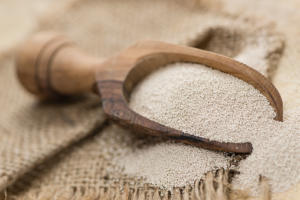Boosting stress tolerance in yeast
Posted on November 7, 2012 by Jana Hiltner, University of Strathclyde
Japanese researchers have discovered that transferring a stress protein from the salt-tolerant plant Suaeda japonica into yeast makes it more tolerant towards stresses such as heat, cold, high salinity, extreme pH and hydrogen peroxide. These findings could lead to new ways of improving commercial yeast strains to increase yields.

The signalling molecule guanosinpentaphosphate (ppGpp) is normally produced by bacteria during nutrient starvation. It lowers growth rate, reduces stable RNA synthesis and affects many other cellular processes, thereby enabling the bacterium to survive harsh conditions by limiting energy usage. The enzyme that synthesises ppGpp is found in plants as well as bacteria, but not in mammalian cells or eukaryotic micro-organisms such as fungi. A recent study in Microbiology has shown that when the enzymes that synthesise ppGpp in plants are introduced into yeast, the cells are more able to survive in stressful conditions.
In yeast it is not clear how, or if, a similar “stress program,” as seen in bacteria, manifests itself. Nevertheless, the results showed that yeast cells react in a similar way to ppGpp as bacteria, displaying a decrease in growth rate, as well as a change in the expression of genes involved in stress responses. Interestingly, in plants, ppGpp was localised in the intracellular fluid and not in the mitochondria as expected. It remains unclear how ppGpp interacts with yeast cells and whether it targets mainly the RNA polymerase – as in bacteria – or if it interacts with other cellular components
The results demonstrate that yeast cells have a clear physiological response to the presence of ppGpp. This discovery might be an interesting starting point for investigating the evolution of stress tolerance among the different domains of life. Further research could also be commercially exploited to produce novel strains of stress-tolerant yeasts for ethanol production or food fermentation.
